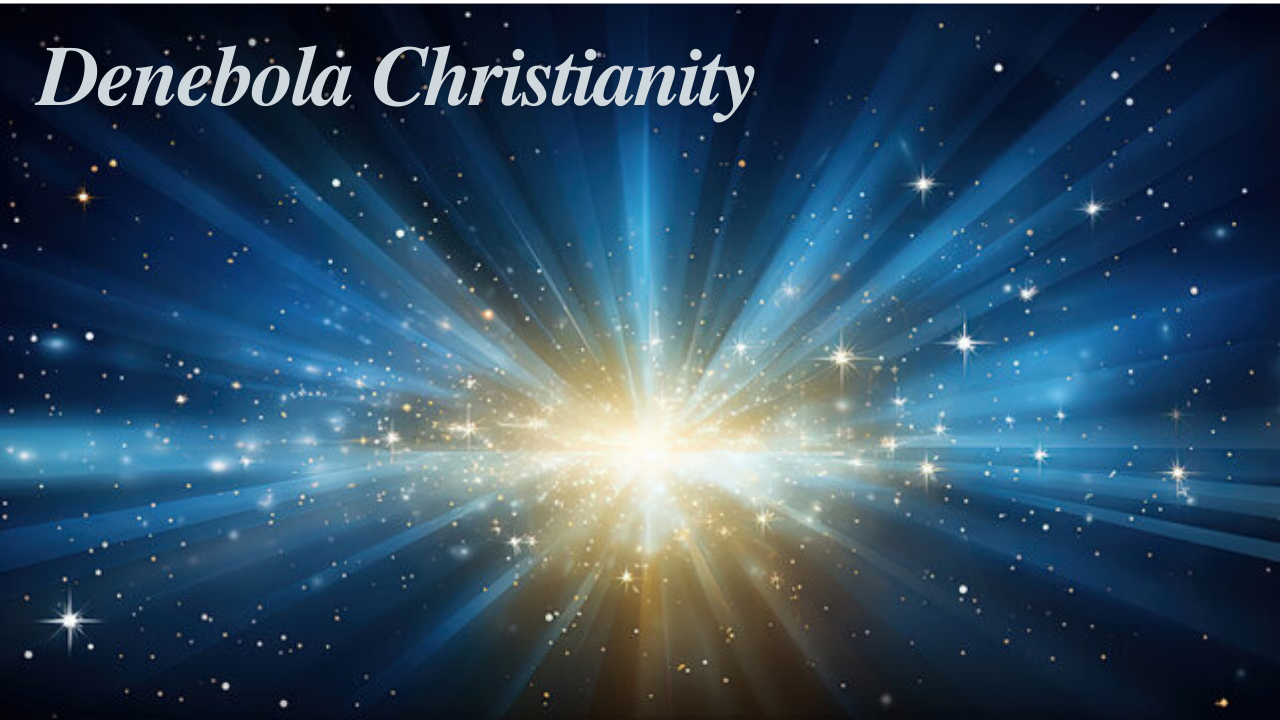Denebola Christianity is a unique spiritual practice that draws inspiration from the star Denebola, situated in the constellation of Leo. This faith path blends Christian teachings with cosmic symbolism, creating a distinct belief system that resonates with both ancient and modern seekers. Denebola, often seen as a symbol of clarity, guidance, and divine wisdom, offers rich symbolic meaning that some Christians find harmonizes with their faith. This article delves into the principles of Denebola Christianity, exploring its origins, key teachings, and the deep spiritual significance of Denebola as both a celestial body and a source of divine inspiration.
Understanding Denebola: The Star and Its Meaning
Denebola is a bright star located at the tail of the constellation Leo. As one of the most notable stars in the sky, it holds a position of interest for astronomers, astrologers, and spiritual seekers alike. Its name, derived from Arabic, means “the lion’s tail,” and its brilliance has inspired mythological and symbolic interpretations across cultures. In spiritual terms, Denebola is often associated with clarity, strength, and guidance, qualities that align well with Christian virtues of faith, wisdom, and resilience. The star’s prominent location in the night sky has made it a symbol of divine presence and enlightenment, concepts that serve as pillars in many spiritual frameworks.
Historical Connections Between Stars and Spirituality
Throughout history, stars have captivated the minds of believers, and their presence in the heavens has often been seen as evidence of divine order. In ancient Mesopotamia, Egypt, and Greece, stars were connected with gods, spirits, and destiny. In Christian tradition, the role of stars can be seen in the story of the Star of Bethlehem, which guided the Wise Men to the birthplace of Jesus. Stars have often symbolized divine guidance, and celestial bodies have been viewed as markers of God’s design in the universe. Denebola Christianity builds on this tradition, viewing Denebola as a reminder of divine wisdom and purpose.
Origins of Denebola Christianity
Denebola Christianity is not an established Christian denomination but rather a spiritual interpretation that connects Christian values with cosmic themes. Its origins are unclear, but it seems to have emerged from individuals seeking a deeper connection between their Christian faith and the cosmic order. Some followers may have been inspired by the mystical aspects of Christianity, where contemplation of God’s creation is seen as a path to deeper understanding. By associating Denebola with Christian values, followers find a unique form of inspiration that bridges ancient cosmic wonder with modern spirituality.
The Influence of Denebola in Christian Symbolism
Denebola holds unique symbolism within this spiritual practice. For followers of Denebola Christianity, the star embodies values such as clarity, purity, and guidance, aligning with Christian virtues of wisdom, truth, and righteousness. Just as Denebola illuminates the night sky, it is seen as a symbol of spiritual enlightenment and the journey towards a closer relationship with God. Some interpretations even associate Denebola with the concept of Christ as the “light of the world,” suggesting that just as Christ guides believers, so too does Denebola serve as a guiding light for those on their spiritual journey.
Denebola and Its Cosmic Significance in Christianity
In Denebola Christianity, the star is viewed as part of God’s grand design of the cosmos, a creation meant to inspire awe and reverence. This belief echoes the Psalms, which celebrate the heavens as a testament to God’s handiwork. Denebola’s place in the constellation Leo, symbolizing strength and leadership, is often interpreted as a sign of God’s omnipotence and authority over creation. The star serves as a reminder of the vastness of God’s creation and the interconnectedness of all life under divine wisdom. By focusing on Denebola, followers of this path aim to deepen their appreciation of the universe as a reflection of God’s beauty.
Spiritual Teachings in Denebola Christianity
Denebola Christianity emphasizes key spiritual teachings that encourage personal growth, humility, and cosmic awareness. Followers believe that by contemplating Denebola and the universe, they can gain insights into God’s wisdom and love. This approach often involves meditation, prayer, and the study of both Christian texts and natural phenomena. Unlike traditional Christianity, Denebola Christianity may focus more heavily on interpreting natural elements as expressions of God’s will, inviting believers to see the world around them as a source of spiritual inspiration and divine messages.
Denebola as a Symbol of Guidance and Light
As a guiding star, Denebola symbolizes clarity and purpose. In Denebola Christianity, this star is considered a beacon that lights the path for believers in times of darkness and uncertainty, much like how the Christian faith serves as a foundation in challenging times. Followers may view Denebola as a metaphor for Jesus’s teachings, guiding them to a deeper connection with their spiritual path. This star embodies the theme of “light in darkness,” a common motif in Christianity, reminding believers of God’s unwavering presence even in life’s most difficult moments.
Denebola in Christian Art and Iconography
The use of Denebola as a symbol has made its way into Christian art, where it may appear as a star of hope or divine guidance. This art often incorporates celestial themes, with Denebola depicted alongside symbols of faith and resilience. Paintings, icons, and religious texts may reference Denebola as a representation of spiritual purity or a reminder of God’s omnipotence. In some cases, artists use Denebola to symbolize the spiritual journey, using its brightness to highlight the power of faith in guiding believers through life.
Denebola in Christian Mysticism
Denebola Christianity resonates strongly with mystical elements, encouraging followers to seek personal, experiential connections with God. Mystics within this belief system may engage in contemplative practices, where meditating on Denebola’s light becomes a focal point for divine encounters. This approach to faith allows believers to experience a form of transcendence, wherein the star acts as a gateway to understanding God’s mysteries. This mystical interpretation of Denebola serves to deepen one’s spiritual insights and foster a sense of unity with the cosmos.
Denebola’s Influence on Modern Christian Thought
In recent years, Denebola Christianity has seen growth among individuals who are drawn to integrating cosmic symbolism into their faith. This practice aligns well with a growing interest in spirituality that transcends traditional religious boundaries, incorporating elements of natural observation and contemplation. For modern Christians, Denebola Christianity offers a fresh perspective on connecting with God through creation, promoting a holistic understanding of faith that embraces the universe’s beauty as part of God’s design.
Astrology vs. Christianity: Denebola’s Role in Debate
While astrology and Christianity often differ in interpretation, Denebola Christianity walks a unique path by embracing cosmic symbolism without contradicting core Christian beliefs. Followers are careful to distinguish between the astrological meaning of Denebola and its symbolic value within their faith. Rather than relying on astrological interpretations, they focus on Denebola’s role as a sign of divine wisdom, viewing the star’s presence in the heavens as an indication of God’s purpose in the natural world.
Comparing Denebola Christianity with Other Christian Traditions
Denebola Christianity shares some similarities with other Christian traditions, especially those that incorporate contemplation and mysticism. However, it is distinct in its emphasis on cosmic symbols, which are often downplayed in mainstream Christian denominations. While Catholic, Orthodox, and Protestant traditions emphasize doctrine and rituals, Denebola Christianity encourages followers to explore God’s creation as an active source of inspiration and guidance.
Challenges and Misconceptions
As a relatively new spiritual path, Denebola Christianity faces challenges and misconceptions. Some may view it as an unconventional form of Christianity or misunderstand it as aligning with astrology. However, followers assert that their belief system is rooted in Christian values and serves to enhance their faith by drawing closer to the mysteries of God’s creation. By addressing these misconceptions, Denebola Christianity continues to gain acceptance as a legitimate path for spiritual growth.
The Future of Denebola Christianity
Denebola Christianity has the potential to grow as interest in spiritual practices that blend tradition with cosmic awareness increases. This unique approach offers Christians a chance to explore their faith with a fresh perspective, encouraging both reverence for God’s creation and a sense of purpose. As more individuals seek ways to connect with God through nature and the cosmos, Denebola Christianity may evolve, incorporating additional elements that enhance believers’ understanding of faith and the universe.
Conclusion
Denebola Christianity offers a fascinating bridge between traditional Christian values and cosmic wonder. By focusing on Denebola as a symbol of divine guidance and light, followers find a path that combines awe for God’s creation with an enduring faith in His wisdom. This belief system serves as a reminder that spirituality and the universe are deeply intertwined, inviting believers to find inspiration in the heavens as they walk their path of faith.
FAQs
- What is Denebola Christianity? Denebola Christianity is a spiritual path that integrates the symbolic significance of the star Denebola with Christian teachings, emphasizing the star as a symbol of divine guidance and wisdom.
- How does Denebola symbolize Christian teachings? Denebola is seen as a representation of clarity, strength, and spiritual guidance, aligning with Christian values of faith, wisdom, and the light of Christ in the world.
- Is Denebola Christianity a form of traditional Christianity? While rooted in Christian beliefs, Denebola Christianity is a unique spiritual interpretation, combining traditional Christian values with cosmic symbolism.
- How is Denebola used in Christian art? In Christian art, Denebola often symbolizes spiritual clarity and divine presence, sometimes appearing as a guiding light or source of inspiration.
- Can one practice Denebola Christianity within other denominations? Yes, many followers integrate Denebola Christianity’s principles with other denominations, enhancing their faith through contemplation of cosmic symbols within a Christian framework.










